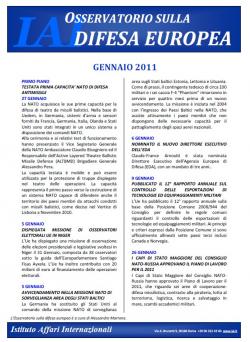Observatory on European defence, July-August 2002

July
Danish Presidency and Greek Contribution
The Danish Presidency semester started on 1 July; given the 1992 Danish opt-out from ESDP, the Danish government will not chair the meetings concerning defence matters (except the PSC).
Greece, which will hold the Presidency as of January 2003, will assume this functions and has presented an annual program on military aspects.
The main goals are to further EU operational capabilities, reach a permanent agreement with NATO and strengthen the cooperation in the defence industry sector.
The beginning of the Danish-Greek “co-Presidency” once again demonstrates the negative impact of Presidency rotation on the system.
The program proposed by Greece is basically a summary of the questions still unattended in the last two years; the situation is aggravated by the fact that Greece plays a direct role in the dispute with Turkey that is blocking the EU-NATO agreement.
Since Italy will assume the Presidency in July 2003, after Greece, there is a strong need to coordinate as soon as possible the Italian program for ESDP with the Greek one.
23 July 2002
ESDP, European constitution – Belgian Initiative
The Belgian Prime Minister Guy Verhofstadt presented to the English and French governments a proposal to include a mutual solidarity clause in the future European constitutional charter under discussion at the Convention. It would imply a collective defence mechanism in the event of an attack (or act of terrorism) against a Member country.
Moreover, the Belgian government sponsors the development of a common armaments market and the pooling of all multinational capabilities already available at the European level.
The Franco-German Summit on defence, held on 30 July, backed these proposals.
Verhofstadt’s letter (unusually directed to the English and French Governments, probably because of their dominant role in the defence sector), comes at a difficult time for CFSP and ESDP.
The high cost of not representing a strong European player in the security arena was recently shown on two different occasions: the Spain-Morocco crisis over Persil Isle sovereignty and the deterioration of transatlantic relations, as epitomised in the case of the International Criminal Court (ICC). In fact, on 1 July, the US, to express its disappointment with the ICC, vetoed a UN resolution to continue the military presence in the Balkans; only a successive compromise brokered by the EU saved the international missions, at least in the short term.
The Belgian proposals seem to be heading in the right direction, but the lack of response from the institutions is indicative of the persisting trend of substantial re-nationalisation of defence policies after September 11th.
-
Details
Roma, Istituto affari internazionali, 2002 -
Issue
02/07-08


